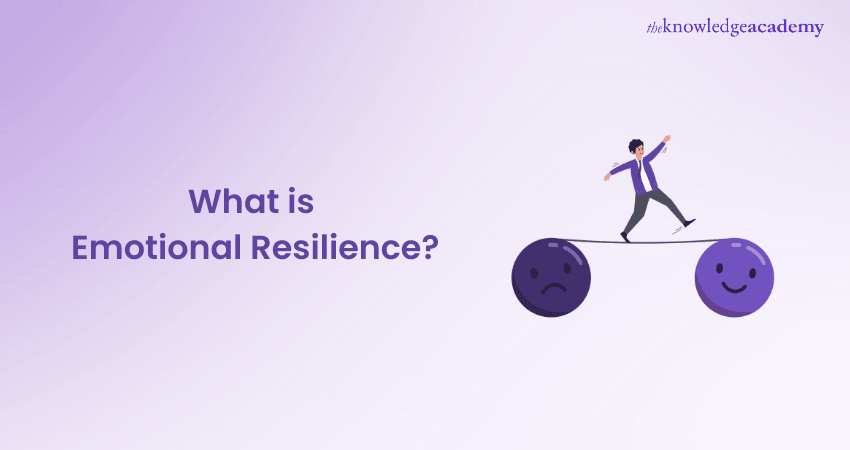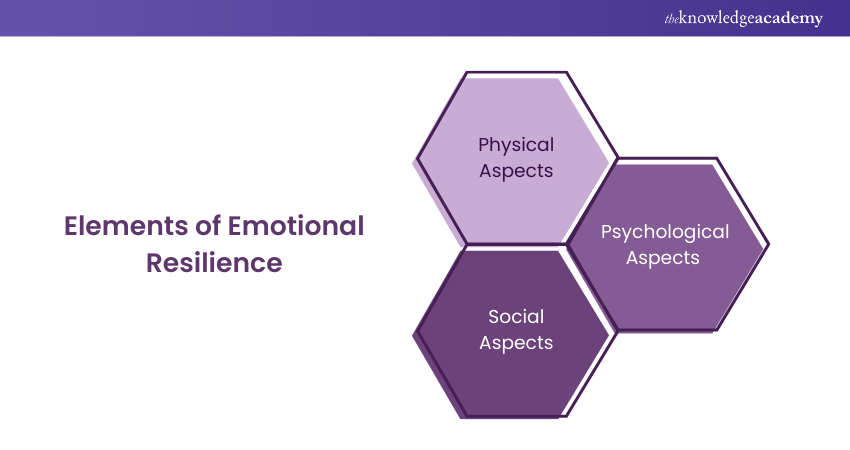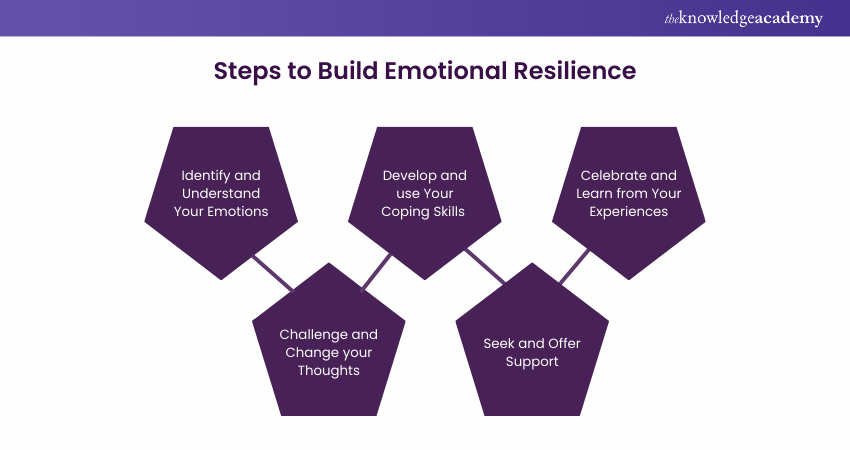We may not have the course you’re looking for. If you enquire or give us a call on 44 1344 203 999 and speak to our training experts, we may still be able to help with your training requirements.
We ensure quality, budget-alignment, and timely delivery by our expert instructors.

Think of a tree in a storm—it bends with the wind but doesn’t break. What is Emotional Resilience? It’s the power to bounce back from tough times, adapt to challenges, and come out even stronger.
Being resilient doesn’t mean avoiding difficulties—it means facing them, learning from them, and growing in the process. What is Emotional Resilience? It’s what helps us handle stress, stay positive, and keep going even when things get tough.
Curious to know how you can build Emotional Resilience and tackle life’s ups and downs like a pro? Keep reading!
Table of Contents
1) What is Emotional Resilience?
2) Elements of Emotional Resilience
3) Characteristics of Emotional Resilience
4) Steps to Build Emotional Resilience
5) What are the 7 Cs of resilience?
6) What are the 3 Ps of emotional resilience?
7) Conclusion
What is Emotional Resilience?
Emotional Resilience, also known as psychological or stress resilience, is a person’s ability to handle stress and stay in control. Someone with strong Emotional Resilience stays calm during tough times. They find ways to manage stress and return to a balanced state.
On the other hand, a person with low Emotional Resilience may struggle to cope. They might feel overwhelmed or react with anger. Building Emotional Resilience helps you stay steady, even in difficult situations.

Elements of Emotional Resilience
Emotional Resilience consists of three main elements: physical, psychological, and social. These elements are interrelated and influence each other. Let us look at each of them in more detail:

1) Physical Aspects
The physical aspects of Emotional Resilience refer to how we take care of our body and health. This includes our diet, exercise, sleep, hygiene, and medical care. A healthy body can support a healthy mind, and vice versa. Besides, physical activity can reduce stress, improve mood and cognitive function, and boost the immune system.
Similarly, getting enough sleep can improve our memory, concentration, creativity, and emotional regulation. On the other hand, deprived physical health can increase our vulnerability to stress and affect our mental well-being.
2) Psychological Aspects
The psychological aspects of Emotional Resilience refer to how we think, feel, and behave in response to stress and challenges. This includes our mindset, attitude, beliefs, values, goals, and coping skills. A positive and flexible mindset can help us to see challenges as opportunities rather than threats and to focus on what we can control rather than what we cannot.
A positive attitude can also help us to appreciate what we have rather than what we lack and to express gratitude rather than resentment. A clear and realistic sense of thought can help us to find our strengths and weaknesses and to set achievable and meaningful goals. Various coping skills can help us manage our emotions, solve problems, communicate effectively, and seek help when needed.
3) Social Aspects
The social aspects of Emotional Resilience refer to how we relate to others and our environment. This includes our family, friends, colleagues, community, and culture. A strong and supportive social network can provide us with emotional, practical, and informational support, as well as a sense of belonging and identity.
A positive and respectful relationship with ourselves and others can also foster trust, empathy, and cooperation. A diverse and inclusive environment can expose us to different perspectives, experiences, and opportunities and enrich our learning and growth.
Elevate your Emotional Intelligence with our Emotional Intelligence Training – Sign up today!
Characteristics of Emotional Resilience
There are degrees to which stress can be managed; a person doesn’t simply have or lack of resilience. It is for these reasons that the following are some of the main characteristics.
a) Emotional Awareness: Emotionally intelligent people recognise the feelings that course through their veins and the roots which started those feelings. Besides, they can also appreciate the moods, feelings and state of another person since they are more aware of their own psychic state.
Their kind of Emotional Intelligence enables individuals to react appropriately to others and to have better strategies and coping mechanisms for emotions such as anger or fear.
b) Perseverance: If they are striving toward observable objectives or toward learning new ways of dealing with stress, they are active, and they believe it and persevere. The virtues of resilient people include that during the time of difficulty you don’t feel like you are helpless or hopeless.
They are more likely to continue getting a job done should they be confronted with a challenge.
c) Internal Locus of Control: They have a strong opinion that their destiny and their present circumstances are under their own control. This trait is linked with lower levels of stress because people with internal and rational perceptions of the world can cope with stressors in their lives more productively, are more problem-solving-oriented and feel less helpless.
d) Optimism: Finally, flexible thinkers also approach most situations positively and possess personal strength. This can change the way they approach problems, from being helpless to being empowered, or more options become available.
e) Support: More importantly, it is essential to know that social support helps enhance resilience, as well as mental health. Although resilient people are mostly strong individuals, they understand the importance of people's support and can always surround themselves with positive people, friends and relatives.
Do you want to develop skills that increase your self-confidence in the work environment? Register for our Personal Development Courses today!
Steps to Build Emotional Resilience
Emotional Resilience is not something that we have or do not have. We can develop and improve it over time through practice and experience. Here are some steps that can help us to build our Emotional Resilience:

Identify and Understand Your Emotions
Acknowledge and Understand Emotions:
a) Recognise the importance of emotional awareness as a foundation for resilience.
b) Identify the sources or triggers of your emotions, which helps in understanding reactions and patterns.
Meditation and Breathing Exercises:
a) Set aside a few minutes each day for mindfulness meditation, focusing on staying present and centred.
b) Practice deep breathing techniques (like box breathing or diaphragmatic breathing) to calm the body and mind.
Non-reactive Observation:
a) Cultivate the ability to observe emotions as they arise without acting on them immediately.
Challenge and Change Your Thoughts
Developing Emotional Resilience involves analysing and reconstructing thoughts and beliefs that cause or escalate stress and discomfort.
Methods to achieve this include:
a) Rational Emotive Behaviour Therapy (REBT)
b) Cognitive Behavioural Therapy (CBT)
c) Positive psychology theories and models
These methods help:
a) Identify negative or irrational thinking patterns
b) Replace these patterns with more constructive and assertive thoughts.
Develop and Use Your Coping Skills
This step helps in building Emotional Resilience which involves using and practicing developed coping skills as needed. There are various ways to enhance coping skills, including:
a) Problem-solving approaches
b) Decision-making and time management
c) Goal setting
d) Assertiveness
e) Humour and relaxation
These methods help handle stress and challenges constructively. If additional assistance is needed, professional support can be sought through:
a) Counselling
b) Coaching
c) Other forms of therapy
Seek and Offer Support
The fourth step in developing strong Emotional Resilience is engaging in positive social interactions. Benefits of positive social interactions:
a) Receiving help, motivation, and encouragement from others
b) Offering encouragement and advice to those in need
Ways to engage in positive social interactions:
a) Finding or forming a support group
b) Joining a peer group or mentorship group
c) Participating in a volunteer organisation
Celebrate and Learn from Your Experiences
The fifth and final step in building resilience is valuing both successes and failures. These methods help identify and avoid repeating mistakes in the future. Practical applications for this step include:
a) Keeping a gratitude journal
b) Maintaining a success log
c) Implementing a reward system to encourage and monitor positive behaviours
These tools help celebrate wins. Additional tools for learning from failures:
a) Keeping a failure log
b) Using a reflection journal
c) Establishing a feedback loop
Master the art of Sentiment Analysis with our Sentiment Analysis Training – Sign up now!
What are the Seven Cs of Resilience?
The Seven Cs of Resilience are key qualities that help people handle challenges and bounce back from difficulties. They include Competence, Confidence, Connection, Character, Contribution, Coping, and Control. These qualities work together to build inner strength and help individuals navigate tough situations.
What are the Three Ps of Emotional Resilience?
The Three Ps of Emotional Resilience—Personalisation, Pervasiveness, and Permanence—help explain how people react to difficulties. These factors were introduced by psychologist Martin Seligman to describe common thinking patterns that affect resilience.
Conclusion
We hope you now understand What is Emotional Resilience—the ability to handle challenges and stress in a positive way. By developing this skill, you can improve your well-being, boost your performance, and increase your happiness. Following simple steps to build resilience will help you stay strong and adapt to life’s challenges.
Learn how to thrive in the face of adversity with our Resilience Training – Sign up now!
Frequently Asked Questions
What is the Difference Between Emotional Resilience and Emotional Intelligence?

Stress coping skills can be defined as the capacity to recover from stress and bounce back in the face of adversity and stress management. Emotional intelligence, on the other hand, entails being able to acknowledge feelings that a person experiences. Resilience is about the tolerance to stress; intelligence is about vigilance
Is Emotional Resilience Innate or Learned?

ER is not a matter of temperament or genes but can be cultivated. It involves a variety of psychological aspects, such as personality, the way we were raised, the environment, and our experiences. But it is not immovable or carved in stone. They are flexible because they can be made and refined with time, with practice and experience.
What are the Other Resources and Offers Provided by The Knowledge Academy?

The Knowledge Academy takes global learning to new heights, offering over 3,000 online courses across 490+ locations in 190+ countries. This expansive reach ensures accessibility and convenience for learners worldwide.
Alongside our diverse Online Course Catalogue, encompassing 19 major categories, we go the extra mile by providing a plethora of free educational Online Resources like News updates, Blogs, videos, webinars, and interview questions. Tailoring learning experiences further, professionals can maximise value with customisable Course Bundles of TKA.
What is The Knowledge Pass, and How Does it Work?

The Knowledge Academy’s Knowledge Pass, a prepaid voucher, adds another layer of flexibility, allowing course bookings over a 12-month period. Join us on a journey where education knows no bounds.
What are the Related Courses and Blogs Provided by The Knowledge Academy?

The Knowledge Academy offers various Personal Development Courses, including Resilience, Emotional Intelligence, and many more. These courses cater to different skill levels, providing comprehensive insights into Competitive Intelligence Process.
Our Business Skills Blogs cover a range of topics related to Resilience, offering valuable resources, best practices, and industry insights. Whether you are a beginner or looking to advance your Business Skills, The Knowledge Academy's diverse courses and informative blogs have you covered.
Upcoming Business Skills Resources Batches & Dates
Date
 Resilience Training
Resilience Training
Fri 21st Mar 2025
Fri 2nd May 2025
Fri 27th Jun 2025
Fri 29th Aug 2025
Fri 5th Dec 2025






 Top Rated Course
Top Rated Course


 If you wish to make any changes to your course, please
If you wish to make any changes to your course, please


